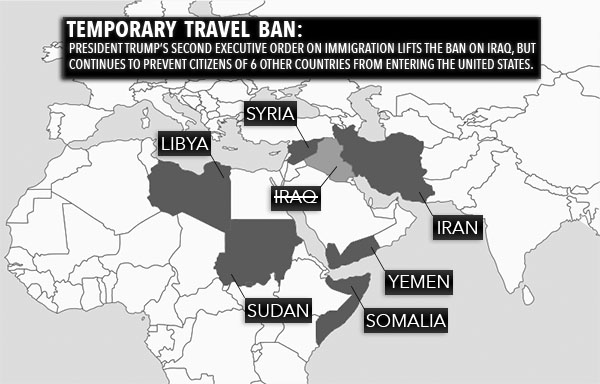Temporary travel ban prompts discussion at South
March 21, 2017
A new executive order rewriting the original travel ban was signed by President Trump that took effect March 16. In this new directive, Iraqi travelers and any person with permanent residency status-regardless of country of origin- are no longer affected.
The previous order involved seven countries and prevented green card holders from entering the country.
Brian Whalen, Business Law teacher, says that executive orders are a part of the executive branch’s powers, but are not considered laws.
“Congress is the only body that can make laws,” Whalen said. “When an order comes out, there is a system of checks and balances. Congress could perhaps pass a law to overturn this order or control the funding. [And only] the judicial branches have the responsibility of determining [the order’s] constitutionality.”
Administratively, Trump’s executive order had little impact on South, according to Principal Lauren Fagel.
“In Illinois, the law says [public schools] must educate every child,” Fagel said. “They do not have to have any type of citizenship or green card in order to get an education.”
According to Fagel, GBS will not allow Customs officers to enter the school with the sole intention of finding a student’s immigration status, as that would violate Illinois law which states that residency is not a factor in a student’s admission to a public school.
“Even if a Glenview police officer [came to the school], there are certain parameters that we, as a school, can set,” Fagel said. “If it is an issue of immediate danger, […] and they suspected a student was involved and [had to] get to that student, we would allow them. However, if they came asking about a student’s immigration status, we would [not] allow them to come in.”
Fagel says the administration has not considered sending any mass communication to students about the order, concerned that negative attention would befall the district.
“What we have done is reached out to a couple families and reminded them that […] their residency status is no concern of us,” Fagel said.
Regardless of lack of change in administrative policy, students like sophomore Sam Weinberg, have voiced their opinion against the executive order.
“The latest version of Trump’s travel ban [does] nothing to address the cause of terrorism,” Weinberg said. “Drone strikes, travel bans and raids only create more resentment towards the West and leads to more senseless violence.”
Senior Lauren Luckey believes that the ban should not identify specific countries as the instigators of terrorism; however, Luckey defends the ban because it protects American citizens.
“[I think] it’s safer to have a ban than no ban at all,” Luckey said. “I feel as if this [new order] is slightly better as it excluded Iraq. We need some stricter laws regarding our countries traveling guidelines in order to put America first and keep our citizens safe.”
Whalen says that as a teacher, the bill has forced him to stay updated with the ever-changing political climate. In his experience, students are more curious than ever about it.
“I think it’s forced me to stay relevant and stay current on topics and [the order] is relevant to not only a Business Law class but to [students] as citizens,” Whalen said. “It is a polarizing topic, and I think students are aware, and students are informed and they bring some of that information with them to class.”



